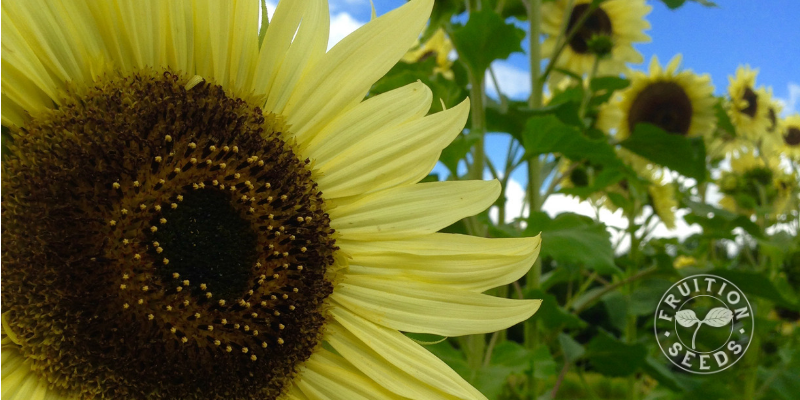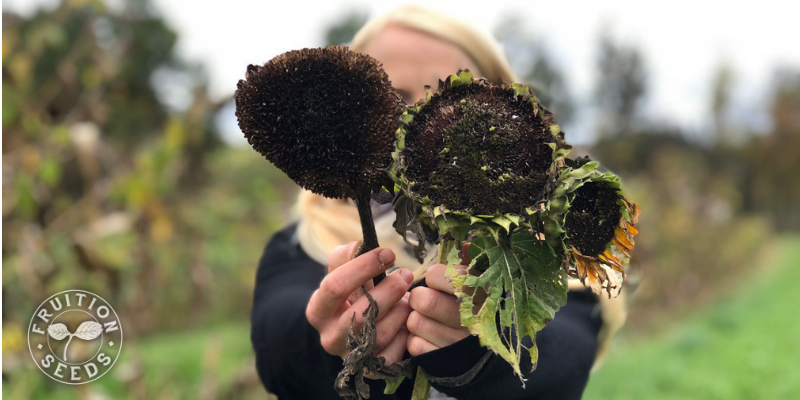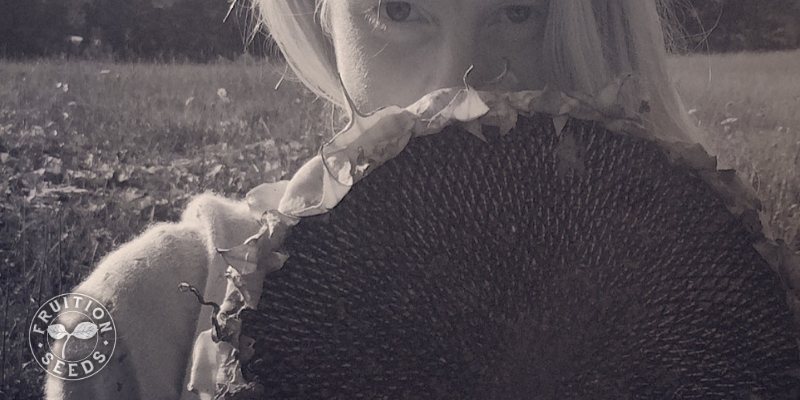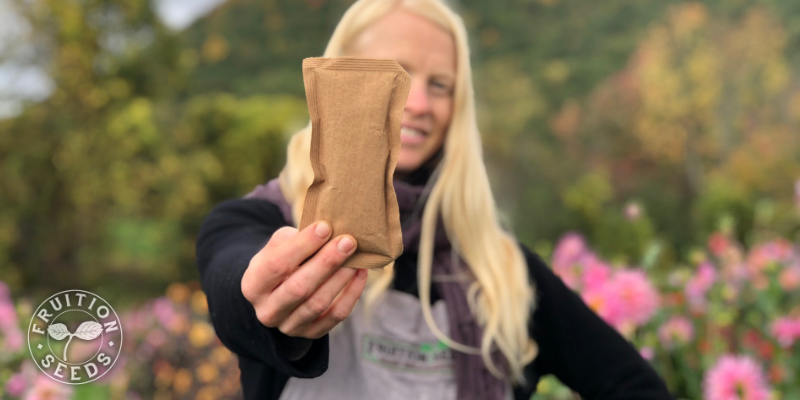To Save Sunflower Seeds
Sunflower seeds would be one of the easiest seeds to save, except that they’re so enticingly delectable to so many other animals, humans included. Nonetheless, we’ve saved many millions of them, so you can, too.

One of the most challenging aspects of saving sunflower seed is this: You must not harvest the most spectacular heads for bouquets! Expect seed about 6 weeks after flower. This is our Lemon Queen, by the way.
To Harvest Sunflower Seeds
First, wait for the birds to confirm the seed is fully ripe.
Though many flower seeds are released with ease once ripe, sunflowers tend to hold them in their heads, making it more challenging to know exactly when they’re ripe. Many flower heads also indicate their seeds are ripe once the stalk beneath is brown and dry, though with sunflowers, that is generally way too late and you’ll rarely find a single seed left.
So yes — this is playing with fire — but if you simply observe when the first birds begin to breakfast in your sunflowers, you’ll know exactly when to harvest them. Don’t dally : )

The head on the left has already been enjoyed by birds; the middle head has been somewhat enjoyed but still has plenty of seed; the head on the right has a couple weeks to go, indicated by the color still present in its still-clinging petals.
Second, remove the head from the stalk.
To Dry Sunflower Seeds
Third, place your sunflower head(s) to dry on a screen in a warm place with lots of airflow, ideally with a fan or two, for at least a week. Sunflowers have a lot of moisture both in the seed and in the head, so it takes longer to dry than you might expect. Especially with the autumn night chill, don’t mess around: keep them warm (above 70 and below 95 F) and the air flowing and you’ll have seeds instead of mold. Chipmunks, mice, squirrels and who knows who else will be tempted to munch your drying seeds if you let them, so don’t! The easiest way to protect your seeds from predation is to lay another screen on top or otherwise prevent ravenous rodents while still encouraging airflow.
Next, remove the seeds from the head, separating the seed from the chaff. Fans make it easy, not to mention fun : )
This is Standfast, Will Bonsall’s sunflower with massive seeds for snacking! Once harvested, we place it in our greenhouse protected from chipmunks with fans blowing incessantly to dry for at least one week.
To Truly Save Sunflower Seeds
You must thwart the sunflower weevil!
I told you, saving sunflower seed is deceptively simple : )
These clever little creatures lay their eggs in the sunflower head, so if you aren’t careful (ie, don’t freeze them to death) they’ll eat a significant percentage of your seeds before spring.
To Freeze Sunflower Seeds
Once you’ve cleaned your seed and dried it as best you can, close the seeds as well as desiccant packets in a plastic bag. Dry them further for 3 days before tossing the bag in the freezer. This ensures the moisture in your seeds is low enough so freezing will only preserve rather than kill them. The weevils have no such luck: They will die as freezing water slashes their cell walls.
Voila: Your sunflower seeds will remain beautifully viable ’til the following season, and likely many more to come!
Desiccant packs are great tools for keeping your seeds dry and extending their storage life years. We share the ones we love here!
While not difficult, saving sunflower seeds is not as simple as it may seem. It’s taken us many years on many farms beyond our own to finally have strategies that keep it simple, consistent and extraordinarily successful.
One final detail…
To Save Pure-Line Sunflower Seeds
Sunflowers are outcrossing and will pollinate each other up to one mile, so if you’re growing multiple varieties of sunflower — or your neighbor is — it’s more than likely you’ll be saving the seed of a brand new variety the world has never seen before.
Hooray!
Let us know what you find : )
Sow Seeds & Sing Songs,

and the Many Beings of Fruition
Evening Colors is my favorite sunflower, often 15 feet tall with long, strong stems perfect for bouquets.




Thank you!